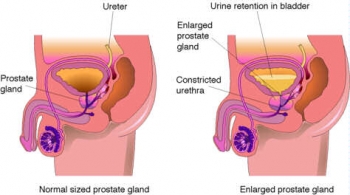How you know you have an aging prostate


The prostate gland is a small organ that performs the big task of secreting a protective fluid that envelopes male reproductive cell when it leaves the human body. This secretion nourishes and protects the cell throughout their journey through the female reproductive system up until conception. The prostate has other functions as well, and has been making the news more and more often in recent times. This has largely been due to the number of cases that have cropped up across the country that allude to prostate problems.
While it seems like a more recent phenomenon, prostate problems have been around for ages, but most people, up until recently, have been so unaware of the issue that they don’t even recognize the signs and consult the doctor, even if they are suffering from prostate related issues. The truth though, is that 1/3rd of the male population across the globe that’s passed the 50 year old mark will suffer from an aging prostate. Want to know if there’s a chance you’re one of the unfortunate 1/3rd? Here’s how you find out.
Signs of an aging prostate
• Urine retention and inability to urinate
• Slow urine stream and/or dribbling at the end
• Incomplete emptying of bladder
• Incontinence
• Frequent urge to urinate, especially while sleeping
• Weakness in urine stream
• Pain and/or bleeding during urination and physical discharge
If a majority of these signs have been experienced by you, particularly if you’re above 50 years old, there’s a very high probability of you suffering from an aging prostate. If this is the case though, there’s no reason to panic, as there are some tried and tested remedies to help alleviate the problem.
Exercise
A healthy physique usually translates to a healthy body in general. So keeping fit is one way to help the aging prostate regain strength. Exercises that promote higher blood flow such as Yoga and cardiovascular workouts are particularly recommended as better blood flow helps provide more oxygen to the prostate while simultaneously removing toxins from the gland. Care should be taken to not undertake any exercise that’s jarring to the reproductive system, as this could end up with a counter-productive result. Therefore, cycling, hard sprints and the like are best avoided.
Health supplements
Any good gym instructor will tell you that for the health conscious, supplements are a must. This also holds true for those who are conscious about their prostate health. There are supplements available that target prostate health directly, such as Super Beta Prostate supplement. This supplement contains plant sterols that have been extracted from saw palmetto, legumes, pygeum and nuts. It’s herb-based and its ingredients are known to help with prostate problems. Super Beta Prostate reviews are overwhelmingly positive in terms of the success of the supplement, and should definitely be considered when looking for supplements.
Diet
There are certain types of food that are backed by medical research help prostate health. These should be imbibed into our daily diet, and the diet in general should be a healthy, balanced one. Such foods include Sweet potatoes, beans, cruciferous vegetables and soy food.
It’s imperative that problems of aging prostate glands are identified as soon as possible, and nipped in the bud. So, if these difficult symptoms do rear their ugly head, remember the 3 key points to a healthy prostate; exercise, supplements and diet.
